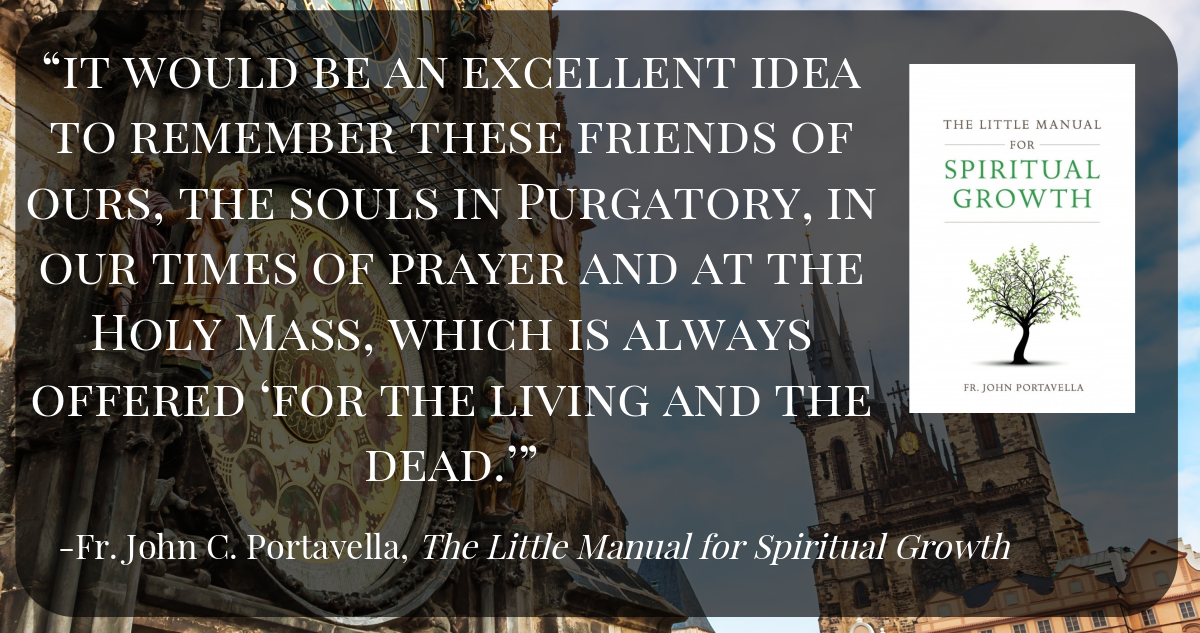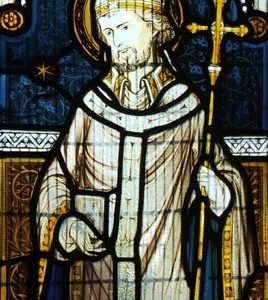As St. Josemaría suggested, our contact with the invisible Audience could be very well seasoned if we place a particular emphasis on each day of the week.
Mondays to Remember the Dead in Purgatory
On Mondays, it would be a good idea to remember the blessed souls in Purgatory. They certainly belong to the silent realm beyond the barrier that separates us from the other side. They are blessed, however, for the grace of God is with them. These souls are becoming more and more inflamed with the love of God and in union with Him.
Accordingly, when we pass in front of a cemetery, when we read an obituary, or when we see a funeral procession, it would occur to us spontaneously to say a prayer for “My good friends, the souls in purgatory.”
We certainly could do better than that, by saying a short
prayer such as: “Lord, grant them eternal life! May they rest in peace!”
Above all, it would be an excellent idea to remember these friends of ours, the souls in Purgatory, in our times of prayer and at the Holy Mass, which is always offered “for the living and the dead.”
Tuesdays to Our Guardian Angel
Tuesdays, on the other hand, could be especially devoted to fostering a close relationship with our guardian angels. Perhaps, you would like to call your guardian angel fondly with some name. It might help you to address him trustfully. It is in line with what St. Josemaría tells us: “Have confidence in your Guardian Angel. Treat him as a very dear friend — that’s what he is — and he will do a thousand services for you in the ordinary affairs of each day.” And he adds, “If you would remember the presence of your Guardian Angel and those of your neighbors, you would avoid many of the foolish things you let slip into your conversation.”
Moreover, on this same day, you might want to remember more often that powerful angelic protector the Lord has given us, as we take the test of our earthly sojourn, in order to counteract the diabolical influence felt in our midst. It may help you to say the St. Michael Prayer.

Wednesdays to Pray With St. Joseph
Wednesdays could be the days on which we try to communicate more often and more intensely with St. Joseph. He is not only the faithful foster father of our Lord Jesus Christ, the virginal spouse of the Virgin Mary, and the provider of the household of Nazareth but is also the model of workers, the master of prayer and the interior life, the patron of the dying, and also the patron of the universal Church.
By this last title, we are reminded that St. Joseph is linked personally and truly with each human being. He belongs to the silent and supernatural world. But this does not mean that he is like a ghost. No, he is very real, and he is interested in all of us, for Jesus — whom he helped in His redemptive work — shed His Blood for all mankind. He is truly a most loving father to everyone. This is how St. Josemaría puts it: “St. Joseph, a father to Christ, is also your father and your lord. Have recourse to him.”
Also on Wednesdays, we could make it a point to invoke St. Joseph in all our needs. At prayer time, we could address him confidently, paying special attention to him. In addition, we could ask him to teach us how to communicate properly with our Lord and our Blessed Mother.
Thursdays Are Linked to the Eucharist
Thursdays are forever linked to the Holy Eucharist, for it was on a Thursday that our Lord, during the Last Supper, instituted it. It might be a good idea to devote this day to meditating and conversing with the Persons of the veiled Audience about this great mystery of faith.
This
is how St. Matthew, inspired by the Holy Spirit, recorded for us the
institution of the Eucharist:
Now as they were eating, Jesus took bread, and blessed, and broke it, and gave it to the disciples and said, “Take, eat; this is my body.” And he took a cup, and when he had given thanks he gave it to them, saying, “Drink of it, all of you; for this is my blood of the covenant, which is poured out for many for the forgiveness of sins. (Matt. 26:26–28)
It was the farewell supper that linked the old and the new covenants, in order that the following day would be sealed on the Cross, with the precious blood of our Lord. It is appropriate, therefore, to do all we can to make every Thursday a Eucharistic day.
We could begin by attending Holy Mass, even if we are not yet able to do so on the other weekdays. It is a great thing to be present at the re-presentation of the sacrifice of Calvary and to receive worthily the Bread of Life on a day that is not a holy day of obligation. Under these circumstances, we enjoy the additional and personal assurance that we attend the Holy Mass not out of any fear or requirement but out of pure and free love.
On
Thursdays, we could make it a point to bring to our prayer this great mystery
of love and not to fail in visiting our Lord in the Blessed Sacrament, the
silent, and often lonely Guest of countless Catholic churches and chapels.
In addition, we could endeavor to multiply the expression of our eagerness to receive Him sacramentally, by reciting Spiritual Communions throughout the day. Many have found it helpful to use one that St. Josemaría liked and recommended: “I wish, Lord, to receive You with the purity, humility, and devotion with which your most holy Mother received you, with the spirit and fervor of the saints.”
Fridays to Remember The Passion of Our Lord
On Fridays, the memory of Mount Calvary looms high. It
was on a Friday when Jesus was hung on a cross for our salvation. It would be a
great pity if we were so immersed in our earthly pursuits that such remembrance
would not mean anything to us. Therefore, we will do well to make an effort to recall
it throughout the day. Without doubt, the best moment for that will be in the
Sacrifice of the Mass that we attend. There we find ourselves at Golgotha, with
the same High Priest, the same Victim, and the same intention Jesus Christ had
at that time. This is possible because He, the eternal Logos (the Second Person
of the Blessed Trinity), always lives — as God — in eternity, that is, outside
the constraints of time and space.
If it is compatible with our professional and family duties, it would be an excellent thing to recite on Fridays the Way of the Cross, a practice that our Mother the Church has enriched with generous indulgences. This is how St. Josemaría puts it: “The Way of the Cross. Here indeed is a strong and fruitful devotion! May you make it a habit to go over those fourteen points of our Lord’s Passion and Death each Friday. I assure you that you’ll gain strength for the whole week.”
To that, Blessed Alvaro del Portillo added, “The Way of the Cross is not a sad devotion. Msgr. Escrivá taught many times that Christian joy has its roots in the shape of a cross. If the Passion of Christ is a way of pain, it is also a path of hope leading to certain victory.”
Saturdays in Honor of Our Lady, Mary
Saturdays have always been linked to our Blessed Mother, Mary. Christians have not forgotten that sorrowful Saturday when the body of Jesus Christ lay in the tomb, and Mary inspired the disciples with confidence and provided them with the great support of her unshakable faith. At the darkest hour, Mary was truly the hope of the Christians. For this reason, over the centuries, Saturday has been a day devoted to our Lady.
It would be an excellent idea to make every
Saturday a Marian day. We could begin by paying special attention to our Lady
when we make our Morning Offering and address the Triune God and His entourage.
She is the Queen of Heaven — that is, the most important person in our Lord’s
retinue. After God comes Mary, and she deserves our special attention.
Accordingly, after offering our entire day to the Almighty, we might want to
speak filially to the Virgin Mary, asking her protection during the day.
There is a very well-known ancient prayer, the Memorare, that Christians have prayed countless times, and it comes to us from St. Bernard of Clairvaux (1090–1153), a Doctor of the Church, who was very much in love with Mary. It would be a good thing to say it often on Saturdays:
In addition, since Saturdays are devoted to Our Lady, it would be
fitting to pray with more intensity all our Marian devotions, such as the Holy
Rosary.
This is what Pope
Pius XII said about it:
What a sweet and most pleasing spectacle to God when, at eventide, the Christian home resounds with repeated praises in honor of the august Queen of heaven! Then the recitation of the Rosary reunites the parents and their children who return from their daily work and brings them together before the image of the Virgin in an admirable union of hearts. It unites them piously with those absent and with the dead.
Furthermore, Pope St. John XXIII called it “a very commendable form of prayer and meditation.” The popes have wholeheartedly recommended the Holy Rosary and have enriched it with indulgences.
It is also very appropriate to recite or sing a Hail Holy Queen
every Saturday in our Lady’s honor. It is a very beautiful ancient prayer that
surely pleases our Blessed Mother. As in the Hail Mary, we remind the Virgin
Mary of her splendid titles, most especially of her condition as Queen, and we
end humbly, asking her help for us who are still “in this our exile.” It is a
prayer that is bound to touch her Immaculate Heart.
Through Sr. Lucia of Fatima, our Lady has also requested that we
observe with particular devotion the first Saturday of five consecutive
months: attending Holy Mass, receiving Communion worthily in reparation for
sins, praying the Rosary in honor of her Immaculate Heart, and spending at
least fifteen minutes meditating on the mysteries of the Rosary. It might be a
good idea to live this devotion every first Saturday of the month.
In line with this request, which comes from our Lady herself, it would be a praiseworthy resolution to dedicate every first Saturday to live and propagate among our friends a love for the Immaculate Heart of Mary and to offer atonement for the sins that are committed all over the world.
Sundays in Honor of the Holy Trinity
Finally, in addition to the weekly commemoration of the
Resurrection of our Lord, we could devote Sundays to honoring, in a special
way, the Blessed Trinity, which is at the very core and summit of the Company
of Witnesses of our lives. The Catechism
of the Catholic Church calls the mystery of the Most Holy Trinity
“the central mystery of the Christian faith and life” (234).
This great mystery should occupy first place not only at the
speculative level but also at the practical level in the lives of Christians.
A good contribution to this is making every Sunday a special Trinitarian day.
On Sundays, whenever we make the Sign of the Cross, we could strive to do it in such a way that we really mean what we are saying: “In the name of the Father, and of the Son, and of the Holy Spirit!” Furthermore, we could bring to our mental prayer this great mystery of our Faith, taking it as the topic of meditation for a few minutes and, perhaps, occasionally, we might find it useful to use the words of the Te Deum, the Angelic Trisagion, or the Athanasian Creed.
On Sundays, while going from one occupation to another, we might find it helpful to repeat some aspiration; for instance: “Glory be to the Father, to the Son, and to the Holy Spirit!” or this one that St. Josemaría said and recommended a great deal: “Hail Mary, daughter of God the Father, Hail Mary, mother of God the Son, Hail Mary, spouse of God the Holy Spirit! Greater than you, none but God!”
✠
This article adapted from a chapter in Fr. Portavella’s The Little Manual for Spiritual Growth. It is available from Sophia Institute Press.













